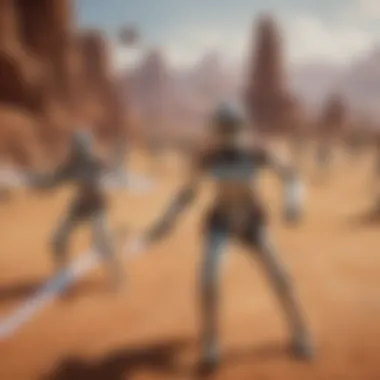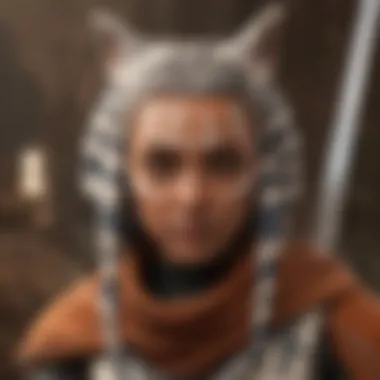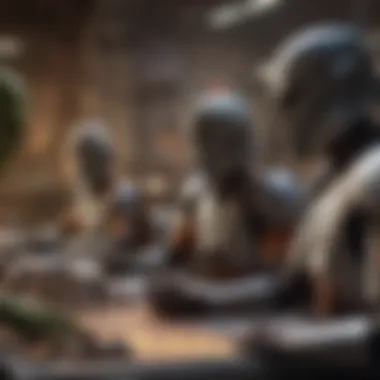Chronological Guide to Star Wars: The Clone Wars Episodes


Intro
The animated television series "Star Wars: The Clone Wars" stands as a significant entry in the expansive Star Wars universe. Spanning seven seasons and a multitude of episodes, it delves deeply into the complexities of the Clone Wars, showcasing the myriad of characters and nuanced storylines. This guide aims to provide an organized perspective on the series, aiding both new watchers and dedicated fans who wish to traverse the intricate pathways of the storyline, character journeys, and thematic undertones.
Overview of Star Wars: The Clone Wars
"Star Wars: The Clone Wars" debuted in 2008 and has since become a staple for Star Wars enthusiasts. While the film set the stage, the series expanded upon the story with depth and grandeur, exploring the events between "Star Wars: Episode II - Attack of the Clones" and "Star Wars: Episode III - Revenge of the Sith."
This show not only introduces new characters and worlds but also provides rich subplots and moral dilemmas that resonate throughout the Star Wars narrative. Central themes include bravery, loyalty, and the personal cost of war, set against the backdrop of a galaxy in turmoil.
Plot/Storyline Analysis
The plot of "Star Wars: The Clone Wars" is not linear; it invites viewers into a detailed narrative web that requires attention to grasp. Each arc unfolds multiple storylines, from battles leading the Jedi and Clone Troopers against their foes, to darker themes regarding corruption and betrayal.
Major events and battles draw heavily on the established lore, giving context to the characters' decisions and futures present in the original trilogies. Episodes cover various planets and factions, offering depth beyond simple skirmishes, addressing the impact of galactic conflict on countless beings. Overall, the series encapsulates the push-pull of hope and despair, often balanced on a knife's edge as allegiances are tested.
Character Development
At the heart of the series lies a rich ensemble of characters. Obi-Wan Kenobi offers a compelling mix of wisdom and emotional restraint, contrasted sharply by Anakin Skywalker’s increasingly conflicted nature.
- Ahsoka Tano, one of the foremost characters, becomes a fan-favorite as her growth from padawan to a figure of independence showcases the complexities of loyalty and ideals.
- Captain Rex, a clone trooper, provides insight into the personhood of clone soldiers, questioning his place and role amidst warfare.
- Asajj Ventress also experiences significant evolution, moving from antagonist to a more nuanced character pursuing redemption.
Through their arcs, viewers witness intense character growth shaped by the harsh realities of war and personal choice.
Visuals and Effects
The animation style of "The Clone Wars" was a crucial factor in its success. With fluid motion and dynamic action sequences, the visual narrative elevates the story's tension and excitement. The detailed backgrounds contribute greatly to world-building in the galaxy far, far away.
Each episode has stellar visual effects, enhancing battles and emotional moments. Although the series started with some critique regarding its art style in the first few seasons, it evolved to meet higher expectations. The visual treatment of lightsaber duels or space battles becomes more intense, rivalling live-action sequels at many points.
"Visual storytelling is as important as dialogue in conveying story mood and themes."
The high-quality animation coupled with effective sound design reinforces its storytelling prowess. As viewers navigate each episode, they experience a vibrant and immersive culmination of art and sound that is emblematic of the Star Wars saga overall.
Preface to Star Wars: The Clone Wars
The realm of Star Wars: The Clone Wars is a deep expanse worth exploring, serving not only as a part of the broader Star Wars mythos but also as a unique narrative in its own right. This animated series enriches the Star Wars universe, bridging the gap between Star Wars: Episode II - Attack of the Clones and Star Wars: Episode III - Revenge of the Sith. Understanding this series is crucial for grasping character arcs, political complexities, and the evolving friendships within the galaxy far, far away.
Overview of the Series
Star Wars: The Clone Wars first premiered in 2008. It came from Lucasfilm Animation, led by significant talent like George Lucas and Dave Filoni. The series did not merely replicate the cinematic experience; it aimed to delve into psychological and existential themes while providing a broader understanding of the conflict. After an initial mixed reception, it managed to garner praise over its run with compelling storytelling, detailed animation, and character growth.
The show's episodic structure features various plots, making it both enriching and sometimes overwhelming for newcomers. In multiple arcs, familiar characters and settings are explored that would engage long-time fans while presenting layers that intrigue newer audiences. Themes of honor, betrayal, and loss flesh out the narrative in unexpected ways.
Development and Reception
The development of Star Wars: The Clone Wars marked a significant shift for the franchise. What began as a modest idea for a movie evolved over time. After the film's release, it transitioned into a regular episodic format on Disney's channels, closely aligned with the aspirations of a younger audience while retaining appeals for adult viewers.
Upon release, it received an uneven critique, with some fans facing animation style that diverged significantly from previous animated work. However, as the episodes progressed, the reception transformed. Fans noted character development, including major shifts for Anakin Skywalker and introduction of new ones, particularly Ahsoka Tano, who became a beloved figure in the Star Wars community. The series showed layers of complexity in war, resulting in a more balanced recognition within the fandom and critical circles.
Moreover, Star Wars: The Clone Wars has held its place well, experiencing modern critical rehabilitation. This success can be attributed to the devoted Star Wars community. Online forums such as reddit.com now thrive with discussions focused on episodes and arcs, exploring their deeper implications. This evolution speaks to the show's lasting impact on both film studies and cultural narratives, opening discussions about morality, choice, and the very nature of humanity amidst the chaos of war.
The success of Clone Wars showcases that believability in character is often what drives fan engagement and strengthens lasting connections with complex themes.
The Chronological Viewing Order


The viewing order of Star Wars: The Clone Wars is essential for experiencing the series' intricate narrative. Unlike traditional TV shows, The Clone Wars follows a non-linear timeline, containing episodes that occur out of sequential order. This characteristic often leads new viewers confusion. Following the chronological order avail advantages for an in-depth understanding. It clearly展示ments character developments and shifts in themes that might otherwise become lost.
This approach illuminates character arcs more visibly. To grasp the implications of events, fans not only follow the story but also comprehend the overarching themes that emerge only when seen in sequence. Familiarity with key moments aids in connecting various plot points, enhancing the overall enjoyment and appreciation of the series.
Understanding Chronological Order
Chronological viewing of The Clone Wars facilitates a coherent timeline for the events that transpire. The series spans multiple seasons, leading viewers through the complexity of the galactic conflicts. To help grasp the narrative flow, many fans compile recommended watches. By poring through this timeline, spectators can witness firsthand how certain character relationships assert themselves while simultaneously being affected by the course of the war.
When assessing episodes in this method, the structures shift from isolated character encounters to vast interconnections, ultimately cultivating richer story understanding. Whether the focus remains on Anakin, Ahsoka, or various other characters, details provide holistic developments during astronomical events.
Comparison to Release Order
The release order of The Clone Wars remains a different experience compared to the chronological approach. The broadcast order follows the reality of when episodes first entered the audience's awareness. Many franchises utilize release approaches to maximize suspense and build expectations.
Thus, several key episodes hold crucial emotional weight even when they appear earlier in a chronological context. Appreciating those episodes without the surrounding narratives might leave a viewer disappointed. Such contrasts emphasize the rich emotional queues aligned with character development that derived from their storytelling stages. Of course, having encounters such as "The Siege of Mandalore" lends considerable dramatic power that experiences differently under the constraints of viewing ranks on first release.
Key Characters and Their Arcs
In 'Star Wars: The Clone Wars,' the exploration of key characters and their arcs serves as a cornerstone of the narrative. Understanding these characters helps viewers grasp the grand themes and complexities that the series illustrates. Key elements to consider include character development, relationships, and the roles they play in shaping the story's trajectory.
Anakin Skywalker
Development throughout the series
Anakin Skywalker undergoes significant change throughout the series. Beginning as a skilled Jedi Knight, viewers see his gradual moral decline influenced by various factors, including betrayal, loss, and societal pressures. This evolution is central to the story, as it showcases the complexities of human emotions and the struggle between light and dark.
His transition from a promising hero to a foreboding figure highlights the overall theme of corruption and the consequences of choices made. Observing Anakin’s journey provides viewers a cathartic experience, understanding how circumstances impact individual development, as well as the wider implications it has on relationships and the galactic landscape. The character's arc is compelling because it illustrates that greatness can be tarnished by relentless tragic events.
Relationships with other characters
Anakin's relationships are one of the most powerful aspects of his character arc. His connection with Padmé Amidala reveals vulnerability, while his bond with Obi-Wan Kenobi showcases friendship and loyalty. These dynamics often present moral dilemmas, impacting Anakin's emotional state significantly. These key relationships highlight the trials faced by a Jedi under immense pressure, demonstrating how personal bonds can influence one’s fate.
Each relationship portrayed reflects the tensions within Anakin, drawing viewers into the inner conflict he experiences, specifically regarding trust, love, and betrayal. This exploration is integral to the viewer's comprehension of Anakin's eventual fate, offering a multilayered perspective that adds depth to the narrative.
Ahsoka Tano
Preamble and growth
Ahsoka Tano's introduction is a pivotal moment in the series. Initially introduced as Anakin’s Padawan, her character's growth exemplifies resilience and independence throughout her journey. Ahsoka's path differs from Anakin’s, marked by her unwavering morality and deep understanding of the larger conflicts at play in the galaxy. This distinction makes her evolution important to the series' themes.
Over time, she transforms from a reckless apprentice to a confident leader. Her story emphasizes the importance of questioning authority and standing for one's beliefs — essential qualities depicted throughout the series.
Key moments in the narrative
Ahsoka has several key moments that shape her trajectory. One significant event is her departure from the Jedi Order, rejecting the organization due to perceived hypocrisy. This moment not only impacts Ahsoka but alters the dynamics of the Jedi Order itself. It raises questions about loyalty and moral integrity, key themes throughout 'The Clone Wars.'
Her growth reflects the ongoing struggle of characters grappling with their identities during chaotic times, ultimately resonating with audiences far beyond the series. Ahsoka’s journey reinforces themes of dignity in emerging from adversity, profoundly impacting viewers’ engagement.
Obi-Wan Kenobi
Role in the Clone Wars
Obi-Wan Kenobi serves as a stable foundation amidst chaos in 'The Clone Wars.' His strategic insights and leadership dominate many battles, offering viewers a glimpse into Jedi discipline and responsibility. Obi-Wan often stands as a moral compass for younger Jedi, guiding them through ethical dilemmas in war.
Though he remains steadfast to his principles, the toll of the conflict shapes him as well. His portrayal brings forth themes of resilience in challenging circumstances, serving as a powerful example of steadfastness. Viewers connect with his calm demeanor and introspection, making them more invested in the characters and environment of the narrative.


Character conflicts and resolutions
Obi-Wan’s conflicts reveal numerous ethical questions surrounding war and duty. He grapples with the burden of leadership yet desires to be a brother to Anakin and a commander to running clones. This provides rich character detail while exploring the essence of love, friendship, and sacrifice within The Clone Wars. His dynamic conflict, pitting duty against personal bonds, highlights the emotional challenges faced by those embroiled in raw conflict.
The resolution of his character arc tackles themes of closure and reconciliation, facilitating a rich narrative thread readers find compelling. The progression of conflict not only conveys crucial military strategies but highlights personal costs born by sacrifice in times of crisis.
The Clones
Individual identities
The depiction of clones in ‘The Clone Wars’ broaches a substantial subject of individuality within uniformity. Unlike what many expect within show, each clone is given a distinct personality that evolves, challenging assumptions related to their obedience. Characters such as Rex and Cody stand out with their complex personalities, showcasing themes of loyalty and individuality.
This exploration underscores a critical narrative — that every life is valuable, even amidst being mass-produced soldiers. Such attention to character uniqueness benefits the article by emphasizing the broader impact of the war and trauma associated with these unique journeys.
Impact on the war
The clones' presence serves not merely as soldiers; they drive numerous plot points revolving around duty, loyalty, and emotions tied in conflict. Their participation complicates the narrative presentation, inviting audiences to examine moral dilemmas tied to identity, utility, and the nature of warfare.
In essence, clones transcend their roles as merely interchangeable assets. The emotional resonance their stories flavor impacts viewer perceptions regarding sacrifice and human cost in battle, deepening engagement with the overall narrative element of the series.
Major Story Arcs
The narrative structure of Star Wars: The Clone Wars revolves around several major story arcs that significantly shape the overall plot of the series. These arcs delve into a range of themes including conflict, morality, and the complexity of relationships. Analyzing these arcs helps viewers appreciate the depth of storytelling within the context of a larger galaxy filled with struggle and politics. They also provide insights into characters' motivations, making them essential for understanding the broader implications of each plot point.
The Siege of Mandalore
The Siege of Mandalore arc stands as one of the most pivotal storylines in The Clone Wars. It uniquely intertwines the destinies of key characters like Ahsoka Tano, Anakin Skywalker, and Obi-Wan Kenobi with the outcome of the Republic's final days. Ahsoka returns to face off against the Sith Lord Maul in a brutal struggle for control over Mandalore.
This arc also showcases the broader implications of the Clone Wars. The battle has profound psychological effects on all involved. It is about loyalty and the coldness of war. Personal relationships are put to the test, and viewers see the desperate measures the Republic takes to ensure victory. This arc emphasizes crucial turning moments in the Star Wars narrative while tying directly to Star Wars: Episode III – Revenge of the Sith.
The Mortis Arc
The Mortis Arc is exceptionally rich in symbolism and philosophy, making it a unique narrative of the series. It presents Anakin, Obi-Wan, and Ahsoka confronting manifestations of the Force representing the Light, Dark, and Unifying aspects. Located in the ethereal realm known as Mortis, this storyline fundamentally explores the choices that define a Jedi.
This storyline is consequential because it sheds light on Anakin's future, providing intimate insight into his character. The themes of destiny and choice are supremely pronounced here. It raises questions about the nature of good and evil, inviting viewers to ponder the essence of the Force itself. While Ahsoka and Obi-Wan assist Anakin, it becomes clear that his path may be predetermined – a troubling notion that becomes especially vital leading towards the consent of Order 66.
The Umbara Arc
The Umbara Arc brilliantly portrays the uncertainties and moral complexities of war, illustrating the darkness on battlefronts beyond physical combat. This arc follows Obi-Wan and Captain Rex alongside a battalion of clones, illustrating friendships buried under layers of orders and conflicts.
Umbara itself exhibits stark contrasts, launching formidable visual and emotional depth. The deception and betrayal faced by the troops symbolize the emotional trauma experienced during the Clone Wars. Rex's internal conflicts are highlighted as he grapples with loyalty and orders while showcasing individual identificaties among the clones. It raises important questions about the cost of war and the inherent humanity buried in obedience and duty.
The Order Connection
The significance of Order 66 within The Clone Wars stretches across timelines, tying neatly into the mysteries and expansions of the wider saga. This order marks the infamous turning point where many Jedi, including Anakin's compatriots, are betrayed. Menacing moments throughout the series foreshadow this pivotal event, establishing an atmosphere of impending doom.
Through different arcs, viewers can dissect how internal conflicts, unscrupulous politics, and agenda-driven actions lead to perfection of this tragic command. Characters like Ahsoka and Rex offer compelling voyages that intertwine with the events preceding Revenge of the Sith, adding layers of narrative depth. While Order 66 culminates in grief and loss, understanding its buildup renders a clearer view of justice and innocence lost upon its execution.
Themes and Motifs
The exploration of themes and motifs in Star Wars: The Clone Wars offers deep insights into its narrative structure as well as character development. These elements enhance the viewers' comprehension of moral complexities and interpersonal dynamics throughout the series. Themes such as war, friendship, and the nature of power convey heavy emotional and philosophical messages, making the show relevant even outside the science fiction genre. Understanding these themes enriches the viewing experience and allows the audience to connect with characters on a more personal level.
War and Morality
The portrayal of war and its moral implications is central to the narrative in The Clone Wars. Characters face dilemmas that force them to choose between duty and personal ethics. The animated series does not shy away from showing the darker side of conflict. It presents warfare as not just a backdrop, but a catalyst for growth and tragedy.


Key examples include how Anakin Skywalker grapples with the consequences of his choices during battles. We witness transformations fueled by the gruesome realities of war. In general, the series raises important questions about justifying actions in times of conflict. What truly defines a hero? Is any action warranted in pursuit of victory? These questions resonate across various representation of war in modern media. Thus, the theme of morality may challenge conventional perceptions of right and wrong throughout the viewing experience.
Friendship and Loyalty
Themes of friendship and loyalty are prominently displayed, affecting character arcs significantly. These bonds shape motivations and influence critical decisions at multiple points in the series. Characters display strong to intricate relationships that depict the warmth of companionship, even in turbulent times.
Ahsoka Tano's journey illustrates this beautifully. Her friendships serve as both comfort and limitation. Through her eyes, viewers understand that loyalty can sometimes lead to painful choices. The relationships hence do not remain simple, exploring the notion that friendship often intersects with uncertainty and sacrifice. The strength and fallibility seen among the Jedi remind viewers of the visceral weight of loyalty.
In light of these concerns, the series does not present friendship idealized but rather reflects the complexity that defines genuine relationships. This brings depth, showcasing how bonds start fraying under the immense pressure of loyalty, resulting in moral quandaries as the war deepens.
The Nature of Power
In The Clone Wars, power is portrayed as both destructive and transformative. The narrative examines not only who wields power but how it affects relationships, friendships, and fundamental principles. Characters like Palpatine exploit the circumstances of war to manipulate others, casting a shadow on morality.
Yet, the dynamic changes through various lenses, like that of the Clones, where notions of individuality clash with collective control. The concept that power corrupts, and that absolute power corrupts absolutely, emerges subtly yet powerfully. Aspects of free will, responsibility, and influence are dissected, leading to significant character arcs centered around what it truly means to exert power in its various forms.
As viewers navigate the precarious alliance and inherent struggles aligned to power dynamics, the series stands as a reflection on both the pragmatism and futility of quests for power, providing thoughtfulness that engages a high-IQ audience through contextual analysis.
Cultural Impact and Legacy
The Cultural Impact and Legacy of Star Wars: The Clone Wars reaches far beyond its animated narrative. It shapes the ongoing discourse surrounding the broader Star Wars universe, creating a context that enhances understanding of the series' roles. The immersive storytelling tackled complex themes that resonate with viewers even today. This dual delivery, both deep and socially relevant, has established a significant foothold in popular culture.
Influence on the Star Wars Franchise
Star Wars: The Clone Wars reinvigorated the Star Wars franchise through its innovative world-building. Initially conceived as merely a spin-off movie, it quickly evolved into a key pillar of the broader saga. The show's ability to weave intricate plots with rich character development enhanced the emotional and intellectual engagement of the audience. Diverse story arcs illustrated long-standing questions about morality, friendship, and power dynamics, adding depth to characters that previously appeared more one-dimensional in the films.
The series can also be credited with expanding the lore of the Star Wars universe. It introduced fans to mystical elements like the Force in novel ways. Viewers gained insights into the nature of the Jedi and the Sith, learning not just about their powers, but about their struggles. Clone Wars effectively juxtaposed good and evil, emphasizing that ideologies can sometimes blur shades.
Key events, like the resurgence of Ahsoka Tano, sparked discussions about character arcs, empowerment, and representation. Her narrative presentation shifted perceptions regarding female heroes in systems traditionally dominated by male figures. Consequently, Ahsoka became a symbol of enduring strength and independence. The impact of these arcs significantly propelled the franchise forward, informing decisions on subsequent series such as Star Wars: Rebels and The Mandalorian.
Fan Reception and Community
The reception of Star Wars: The Clone Wars transformed how fans interact with the franchise in the modern age. Initially, many skeptics worried about the tonal shifts from George Lucas' traditional narratives. However, this skepticism quickly subsided as views shifted toward admiration, showcasing the quality of storytelling. As critics began acknowledging the show as a vital addition to Star Wars lore, it accumulated a loyal audience eager for content.
Fan communities expanded on platforms such as Reddit, where discussions regularly dissect arcs and speculate on character evolution. Such platforms encouraged dialogue around the philosophical dimensions of the series. Fans delved into how individual choices and their ramifications reflect upon societal stages, weaving those timeless themes into contemporary contexts.
The reasons for the community's accolades and support skews towards how various characters evolved throughout the series. Unlike standalone films, Clone Wars fostered deep emotional bonds between fans and characters, from Anakin Groving increasingly darker to Ahsoka embarking on her quest for identity.
Ultimately, the interplay between storytelling in Star Wars: The Clone Wars and fan interactions has encouraged enduring engagement with a legacy that extends well beyond the original trilogy.
This community's growth signifies more than just interest; it showcases a cultural phenomenon. Fans feel empowered not just to passively consume content. Instead, they actively contribute to the dialogue surrounding the franchise's direction, fostering excitement as more stories emerge from this universe.
In summary, the cultural impact and legacy of Star Wars: The Clone Wars redefined our understanding of narrative and community interaction, sown seeds for new series and fueled critical conversations that continue to echo within the franchise.
Finale
The conclusion of this article serves as a vital encapsulation of how 'Star Wars: The Clone Wars' can be structured a viewing experience. Our exploration of episodes, character journeys, and overarching themes provides insights into not only the narrative but also the connective tissue of the franchise as a whole. Through this structured guide, viewers can navigate the extensive content presented in the series with greater awareness of character development and the nuances of storytelling.
Final Thoughts on Viewing Order
Choosing to watch 'The Clone Wars' in chronological order can enhance understanding and appreciation of the characters and their growth. It allows viewers to experience the narrative as it unfolds in real-time within the Star Wars universe. This approach accentuates elements such as Anakin Skywalker's transformation, the rise of Ahsoka Tano, and the eventual ramifications of the choices made by key figures.
By watching in this way, you align your experience with the intended progression of events, leading to a more cohesive understanding of their impact. If you are an avid viewer or just starting, the chronological increase of stakes reflected in each episode may deepen your connection to the characters and their journey amid war.
Encouragement to Explore Further
Beyond merely watching the series, I encourage an exploratory mindset towards supplementary materials. Resources such as character studies, fan discussions and even behind-the-scenes features enrich the landscape of understanding. For instance, visiting platforms like reddit.com can lead you to discussions that highlight theories and fan interpretations that expand upon the endgame of the storyline.
Further, consider engaging with the expanded universe comprising novels and comics where the Clone Wars era continues to thrive. Programs similar to ‘Star Wars: Rebels’ and the storytelling in the broader canon from Disney offer significant insights, extending the themes introduced in 'The Clone Wars'.
In summary, with the comprehensive understanding gained from this article, the finale of ‘The Clone Wars’ is merely a launching point for deeper intrigue within the saga.















